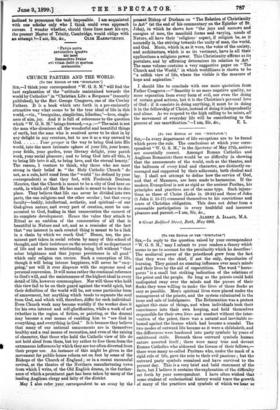CHURCH PARTIES AND THE WORLD.
[TO THE EDITOR OP TEE "SPECTATOR."]
SIR,—I think your correspondent "W. G. S. M." will find the best explanation of the "attitude maintained towards the world by Catholics" in "Christian Life: a Response" (recently published), by the Rev. George Congreve, one of the Cowley Fathers. It is a book which sets forth in a pre-eminently attractive way what seems to be the true ideal of life in this world, —viz., " benignitas, simplicitas, hilaritas,"—love, single- ness of aim, joy. And it is full of references to the question which " W. G. S. M" brings forward,—e.g.:—" The saint is not the man who dismisses all the wonderful and beautiful things of earth, but the man who is resolved never to be shut in by any delight in any creature, but to use it as a way onward to God Your prayer is the way to bring God into His world, into the most intimate sphere of your life, your home, your fields, your garden, your literary delight, your parish work, your social pleasure ; and to bring God into all this, is to bring life into it all, to bring love, and the eternal beauty.'
The reason, 1 venture to think, why those who are most strong in their belief in " the Holy Catholic Church " do not, as a rule, hold aloof from the "world " (as defined by your correspondent) is that they feel, with Frederick Denison Maurice, that the Church is meant to be a city of God here on earth, in which all that He has made is meant to have its due place. They believe that life can never be divided into two parts, the one religious and the other secular ; but that every faculty—bodily, intellectual, aesthetic, and spiritual—of our God-given nature, and every part of creation, must be con- secrated to God, finding in that consecration the earnest of its complete development. Hence the value they attach to Ritual as an emblem of the consecration of all that is beautiful in Nature and art, and as a reminder of the fact that "our interest in each created thing is meant to be a link in a chain by which we reach God." Hence, too, the pro- minent part taken in social reform by many of this school of thought, and their insistence on the necessity of no department of life and no human relationship being left without "that sober brightness and that joyous persistence in all good" which only religion can ensure. Such a conception of life, though it will bring intense happiness, will never be " easy- going," nor will it ever dispense with the supreme need of personal conversion. It will mean rather the continual reference to God's will, and the maintenance of the highest ideal in every detail of life, however commonplace. Nor will those who hold this view fail to be on their guard against the world spirit, but their definition of the world will be, not some particular form of amusement, but anything which tends to separate the soul from God, and which will, therefore, differ for each individual.
Even Church work may become worldly if the worker does it for his own interest and self-glorification, while a work of art (whether in the region of fiction, or painting, or the drama) may become a real means of enabling him to "see God in everything, and everything in God." It is because they believe that many of our national amusements are in themselves healthy and a real means of recreation, and even of the raising of character, that those who hold the Catholic view of life do not hold aloof from them, but try rather to free them from the extraneous influences by which they are too often diverted from their proper use. An instance of this might be given in the movement for public-house reform set on foot by some of the Bishops of the Church of England ; or in a recent successful revival, at the theatre of the Noithern manufacturing town from which I write, of the Old English drama, in the further- ance of which a prominent part has been taken by many of the leading Anglican clergy and laity of the district.
May I also refer your correspondent to an essay by the present Bishop of Durham on " The Relation of Christianity to Art" (at the end of his commentary on the Epistles of St. John), in which he shows how "the joys and sorrows and energies of men, the manifold forms and varying moods of Nature, all have their ' religious ' aspect, if religion be, as it assuredly is, the striving towards the unity of man, the world, and God. Music, which is, as it were, the voice of the society, and architecture, which is as its vestment, have in all their applications a religious power. This Christianity affirms as its postulate, and by affirming determines its relation to Art.9 The same volume contains a very suggestive paper on " The Church and the World," in which worldliness is shown to be "a selfish view of life, where the visible is the measure of hope and aspiration."
I should like to conclude with one more quotation from Father Congreve :—" Sanctity is no mere negative quality, no mere separation from every form of evil, nor even the doing of certain good actions, but it is the Christian's personal love of God ; if it consists in doing anything, it must be in doing it in the fellowship of Christ, instead of doing it independently and alone. As we respond to the high calling to be saints, all the movement of everyday life will be contributing to the process of our sanctification."—I am, Sir, &c., E. L.






































 Previous page
Previous page